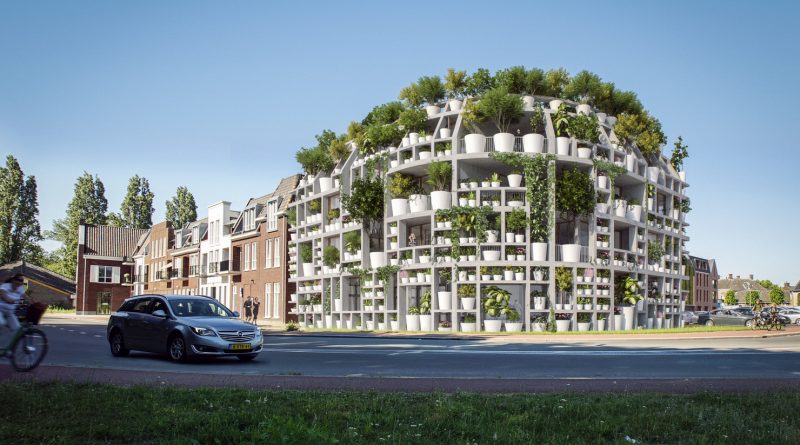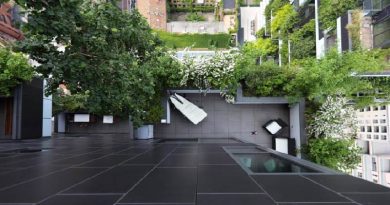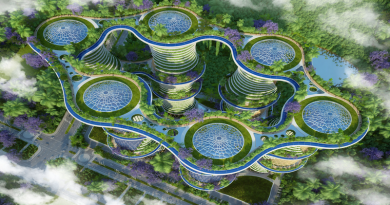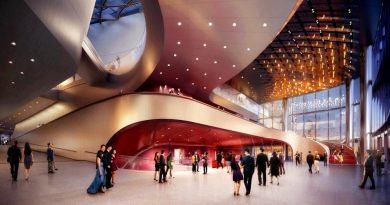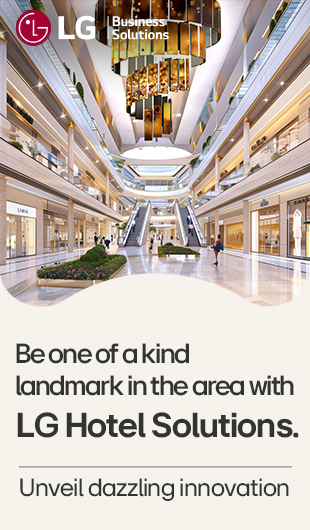MVRDV Designs Facade of Potted Plants along Dommel River
MVRDV Designs Facade of Potted Plants along Dommel River in the Dutch village of Sint-Michielsgestel, Netherlands – to cover a building’s entire exterior.
MVRDV has designed an office and residential building on a corner lot next to the Dommel river in the Dutch village of Sint-Michielsgestel.
Made with a facade that takes the form of potted plants, the project uses a gridded “rack” system to cover the building’s entire exterior in a variety of plants. Designed with MVRDV’s co-architect, Van Boven Architecten, the team wanted to create a landmark project for the village while also being socially conscious and environmentally progressive.
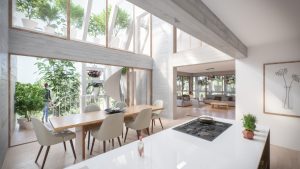
Located on the town’s southern edge, the four-story Green Villa adopts the urban form of the neighboring buildings, while the plant covering was made to help it blend into the landscape of the nearby river, fields and trees. Containing a new office space for a real estate developer, Stein, on the ground floor, five apartments on three floors above, and underground parking, the Green Villa develops one end of a surface car park on the southern edge of Sint-Michielsgestel.
As the team explains, the design continues the formation of the street frontage on Adrianusplein, adopting the mansard roof shape of the previously constructed buildings. Within this shape, the Green Villa diverges from the other buildings on the street in its materiality; a “rack” of shelves, of varying depths, hosts an abundance of potted plants, bushes, and trees such as forsythias, jasmine, pine, and birch. This approach stems from MVRDV’s belief that sustainability implies not only a technological challenge but also a positive change in lifestyle, with urban areas considered as a part of the natural landscape.
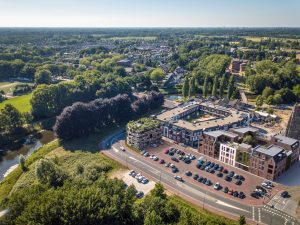
“This design is a continuation of our research into ‘facade-less’ buildings and radical greening”, explains Winy Maas, founding partner of MVRDV. “The idea from the nineties of city parks as an oasis in the city is too limited. We need a radical ‘green dip’: as will be shown soon in a book by The Why Factory with the same title, we should also cover roofs and high-rise facades with greenery. Plants and trees can help us to offset CO2 emissions, cool our cities, and promote biodiversity.” He goes on to say that, “The Green Villa is also a personal project, because I went to school in Sint-Michielsgestel”, adds Maas. “Just like I did before with the Glass Farm, in my native village Schijndel, I am returning to the region of my youth.”
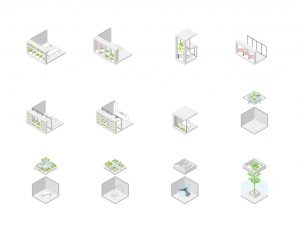
The structure of the Green Villa is based on a square grid four bays wide and three bays deep. MVRDVdeveloped a catalog of varying space modules, such as bedrooms and living spaces, to place within the grid. A similar catalog is used to populate the façade, resulting in a three-dimensional arboretum, a plant and tree library, complete with nameplates and additional information. The plant species are selected and placed with consideration to the façade orientation and the living functions behind, providing either privacy, shade, or views as required. A sensor-controlled irrigation system that uses stored rainwater has been incorporated into the planters, guaranteeing a year-round green facade.
The Green Villa was designed by MVRDV and Van Boven Architecten, with Van Boven Architecten also acting as the project’s developer. Real estate developer Stein will be the occupant of the building’s office space and has also taken on a role assisting the project. Construction is scheduled to start in 2020.
Source: archdaily.com




